Caffeine: What You Need to Know
 How Caffeine Affects Your BodyCaffeine has long been known to elevate blood pressure acutely. A well-designed study examined the impact of 250 mg of caffeine in subjects who consumed no coffee in the previous 3 weeks. These researchers found that the average blood pressure increased by 14/10 mmHg one hour after the caffeine was consumed. Coffee raises blood pressure by both increasing vasoconstriction and reducing vasodilation. A clinical trial of patients with hypertension who stopped drinking coffee did find a significant drop in blood pressure, at least in the short-term.Typical Amounts of CaffeineAll caffeinated drinks are not created equal. Some contain as little as 10 milligrams per cup, while others can have more than 100 milligrams per cup. Here’s a rundown of the most common caffeinated drinks...
How Caffeine Affects Your BodyCaffeine has long been known to elevate blood pressure acutely. A well-designed study examined the impact of 250 mg of caffeine in subjects who consumed no coffee in the previous 3 weeks. These researchers found that the average blood pressure increased by 14/10 mmHg one hour after the caffeine was consumed. Coffee raises blood pressure by both increasing vasoconstriction and reducing vasodilation. A clinical trial of patients with hypertension who stopped drinking coffee did find a significant drop in blood pressure, at least in the short-term.Typical Amounts of CaffeineAll caffeinated drinks are not created equal. Some contain as little as 10 milligrams per cup, while others can have more than 100 milligrams per cup. Here’s a rundown of the most common caffeinated drinks...
- Up to 10 milligrams of caffeine: decaffeinated tea and coffee.
- Up to 50 milligrams of caffeine: most sodas, green tea, iced tea, and energy gum.
- Up to 70 milligrams of caffeine: most energy drinks and coffees.
- More than 100 milligrams of caffeine: some energy drinks, strong coffee, espresso.
Sneaky Caffeine PitfallsMost beverages are served in large portion sizes. There can be multiple servings in a single container!Many energy drinks recommend having multiple containers per day. When that container is already huge, your caffeine consumption can go through the roof!Be Smart About CaffeineGreen tea, decaffeinated tea or coffee, and diet soda are the best bets in terms of caffeine content and calories.If you are caffeine sensitive or if your health professional advises that you skip caffeine, be aware that decaffeinated coffee and tea do contain some caffeine.Make coffee with filters. This is better for your heart – coffee made without filters has been shown to raise cholesterol.A Note About Energy ShotsSome energy drinks come in tiny, caffeine-rich containers called “shots.”5 Hour Energy, for example, contains 138 milligrams of caffeine in just two ounces. It’s also low in calories. The manufacturers recommend taking two shots per day, spaced apart. That’s 276 milligrams of caffeine per day, which is a serious amount of caffeine!Get a printable PDF of this article here!


